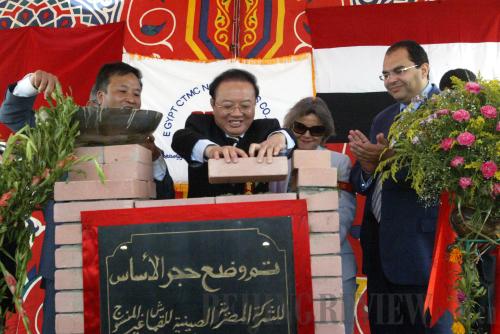|
 |
|
BUILDING BLOCKS: Wei Jianguo (center), China's former Vice Minister of Commerce, lays a foundation for Sino-Arab relations (JIN LINPENG) |
Since 2004, Sino-Arab relations have gained remarkable momentum, particularly with the inauguration of the SACF (Sino-Arab cooperation Forum) aimed at helping China and Arab countries establish new partnerships in a time of growing globalization.
The Fourth SACF's Ministerial Meeting held on May 14, 2010, in Tianjin, China was an indication of the increased contact between Arabic-speaking North African countries and regions, including Algeria, Egypt, Libya, Morocco, Sudan, Tunisia and Western Sahara with China.
Sino-Arab cooperation is primarily focused on encouraging Chinese investments into Arab markets, but it recently included some Chinese neutral mediation to solve the increasingly volatile political crises in the Middle East, including the Arab-Israeli conflict. Such a move came after the Chinese Government realized that having a political role in the region would assist in opening more doors for investment, apart from the fact that success of such investments depends on stability in the area.
Alternative market
SACF was formally established during President Hu Jintao's visit to the Arab League's headquarters in Cairo in January 2004. Hu noted at the time that the formation of the forum was a continuation of the traditional friendship between China and the Arab world and an important move to enhance bilateral ties under new circumstances.
This momentum in Sino-Arab relations came basically after the U.S.-Arab ties were strained after the September 11 attacks in 2001. U.S. doors appeared to close for Arab traders and business people suddenly found it hard to get U.S. visas. Those who based their businesses on the American economy began looking elsewhere. In the process they found China, which joined the World Trade Organization in 2001 and was a new emerging power that could be a potential partner for the Arabs.
China and an Arab country host the SACF in rotation every two years. The Second SACF was held in Beijing in 2006, and the third forum in Bahrain in 2008. The Fourth SACF's Ministerial Meeting was held on May 14, 2010, in Tianjin, China, and the Fifth SACF is scheduled for Tunisia in 2012.
Another factor accelerating the boost in Sino-Arab ties is the global financial crisis, followed by the recent fall in the euro. China's rising economic boom amidst worldwide economic suffering proved it is a model that can be relied on by the Arab region.
Speaking at the Fourth SACF Ministerial Meeting in Tianjin in May 2010, Egyptian Investment Minister Mahmoud Mohieldin said in spite of the global financial crisis, there have been clear positive steps during the past two years in the area of economic cooperation between China and Arab countries.
"We look forward to promoting such cooperation," said Mohieldin.
Suez Economic Zone
The investment relationship between China and Egypt has recently grown stronger. In 2008, China became Egypt's biggest annual investor.
Egypt's government is negotiating with Tianjin Economic-Technological Development Area (TEDA), one of China's most successful investment zones, about replicating the model near the southern approaches to the Suez Canal, the Financial Times said on March 3, 2010, citing Egypt's investment minister.
Under Egyptian law, Tianjin could take a stake of as much as 49 percent in the $1.5 billion Suez Economic Zone, according to the Financial Times.
Minister Mohieldin said he expected the area to attract up to $3.5 billion in investment in the first three years of operation.
The zone is funded with roughly 80 percent Chinese and 20 percent Egyptian capital. It contains 180 factories, producing everything from textiles and electronics to automotive and petroleum-based goods and providing approximately 40,000 local jobs. The first phase of the mega project is scheduled for completion in 2011, with an initial capital investment of $100 million, and exports volume is expected to reach $7.2 billion.
In Egypt, arguably the best investment destination in North Africa, the number of Chinese enterprises is rising speedily.
According to Egyptian statistics, 1,038 Chinese companies have invested an accumulative $311 million mainly in the nation's infrastructure, services and manufacturing sectors, 90 percent of which was made in the past five years.
Ahmed Amin, Chairman of the General Authority for the Economic Zone of Suez, said that in the Economic Zone of Suez is one of the most important national projects in Egypt.
"A total of 200 companies with an investment of $1.5 billion are expected to locate their factories here, and the area will be developed on three phases over nine years," Amin predicted during a tour for the Economic Zone in November 2009.
The Chinese funded Economic Zone of Suez is the first zone model in the Middle East, and the fifth in Africa, after Zambia, Mauritius and two zones being set up in Nigeria. |